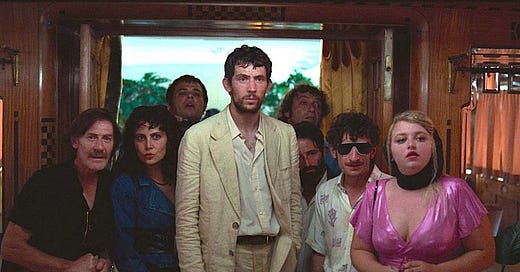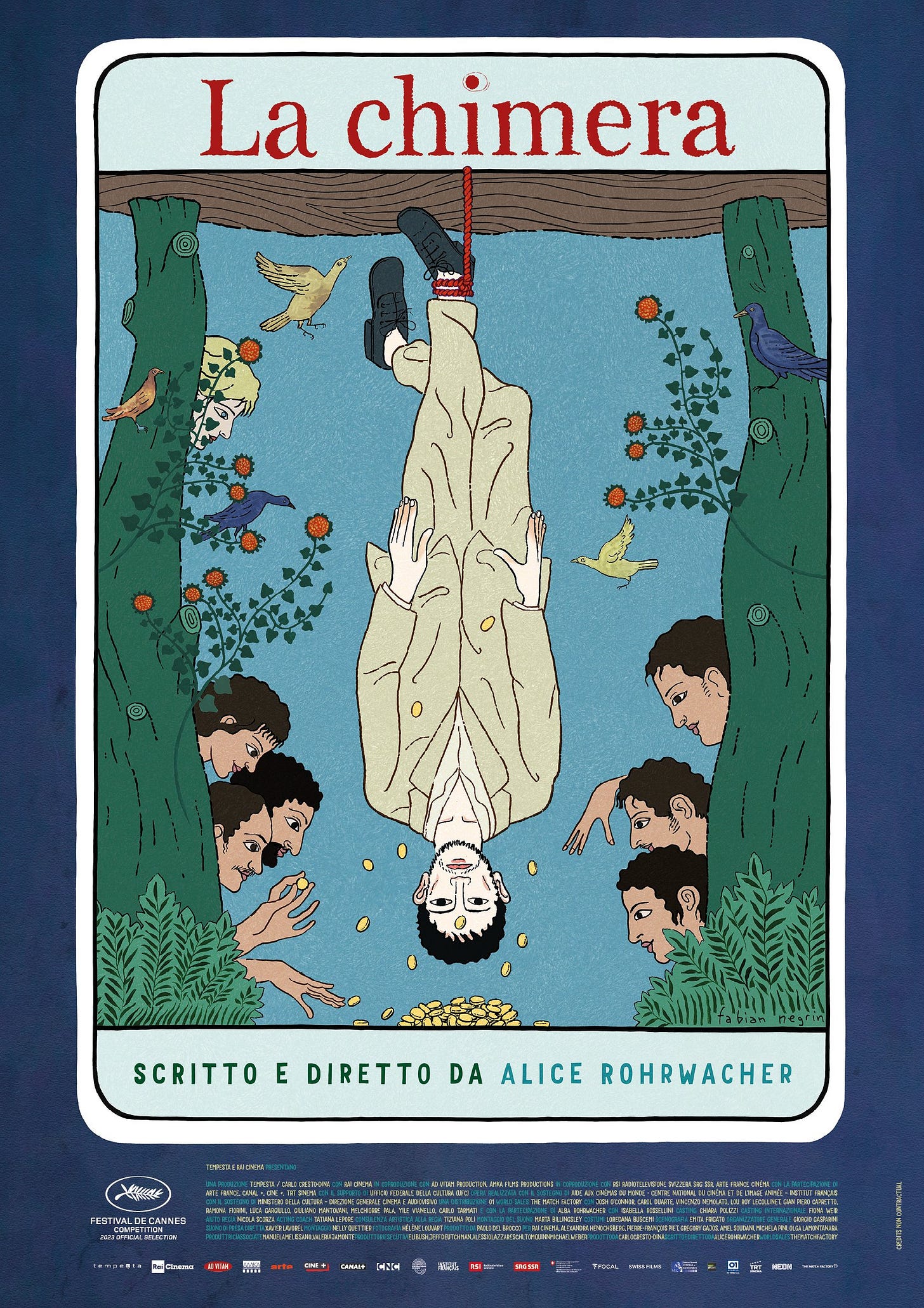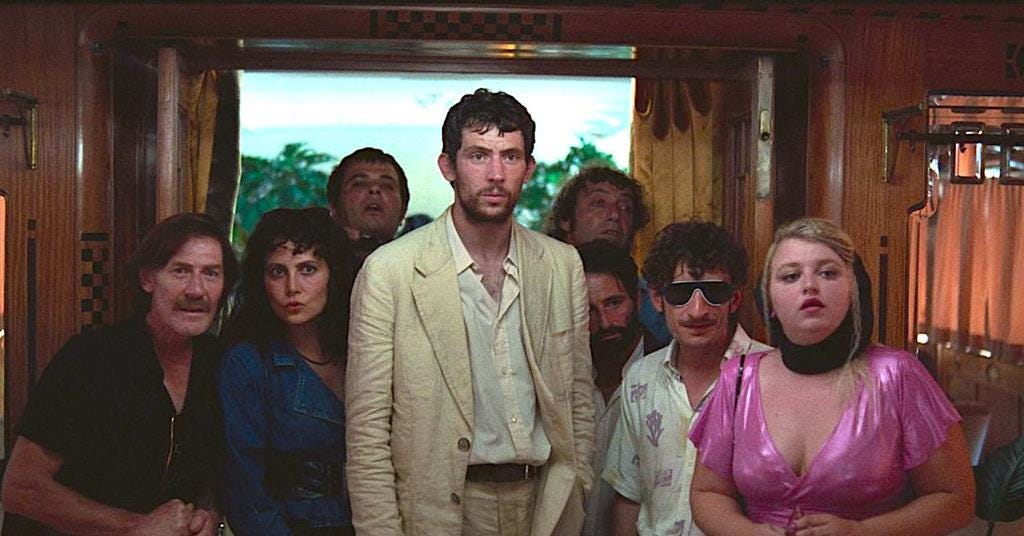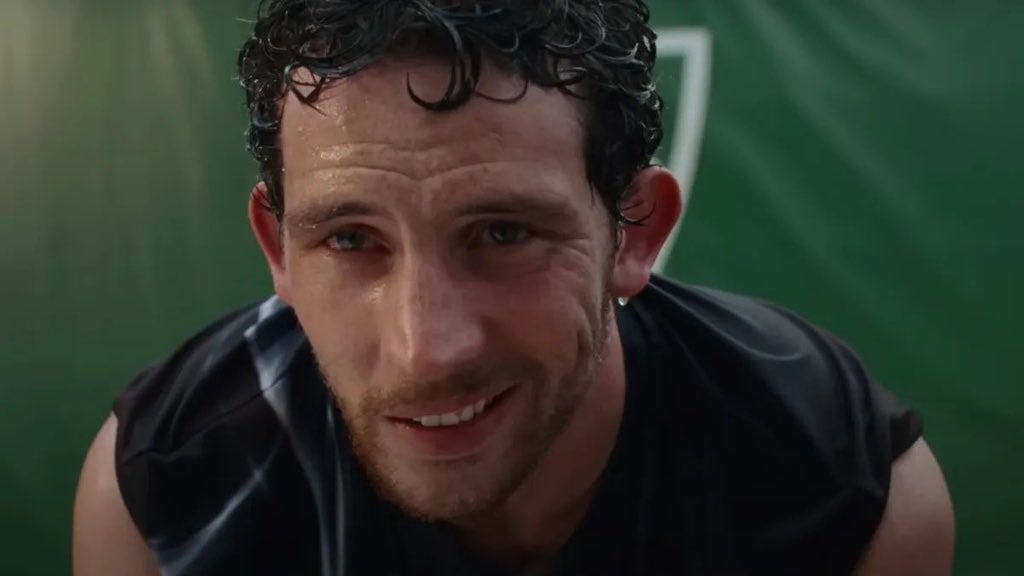Some Thoughts on La Chimera and Josh O’Connor
A few random thoughts on a delightful film and a rising star.
It’s Tuscany in the 1980s (although it feels as though it could be any time before the millennium.) Arthur is on a train. His white suit is dishevelled. His five o’clock shadow is patchy. He hunches over, eager to avoid attention, but there’s something about him that radiates outsider to his fellow passengers. He’s English, although he speaks almost entirely in Italian, and he has no time for small talk or charm. He’s lost and alone, but also a man of unique skills, the kind that landed him a prison sentence. Now, he’s out and wants to… well, we’re not entirely sure, but it’s not returning to his old life with his friends, a ragtag group of transient crooks who break into old tombs and sell off the contents nicknamed tombaroli. Unfortunately for Arthur, he is extremely good at locating said tombs.
La Chimera is the latest film from Italian writer-director Alice Rohrwacher. She's already a festival favourite, with a Best Screenplay award from Cannes to her name as well as an Oscar nomination for Best Live Action Short. Bong Joon-ho is a big fan, describing her work as "a mix of magic realism and neorealism, innocent characters butting up against corrupt behemoths." That’s a good way to describe La Chimera, a romantic drama comedy inflected with mysticism and nostalgia but with a sly satirical gaze towards both history and capitalism. Imagine if Indiana Jones felt a lot more guilt about all the stuff he stole from archaeological digs.
Arthur, played by Josh O’Connor, seems bitter about his near-magical ability to locate these tombs that his kinda-friends plunder with anarchic glee. Any passion he once had for archaeology has long evaporated. He yearns for his lost love Beniamina, who might be dead or simply missing. Her mother Flora (the always-wonderful Isabella Rossellini) waits in her crumbling Tuscan home for her child to return and sees Arthur as her last connection to Beniamina. In her employment is Italia (Carol Duarte), although that seems to generous a description of her job. She's essentially an unpaid servant, under the auspices of Flora being her singing teacher despite her being utterly tone deaf.
It doesn’t take long for Arthur to return to his own questionable job, digging up old graves and looting them under cover of night. Most of what they find is small fry, all things considered. They can’t all be pharaohs, as one of his crew says. Thousands of years of history amount to just another gig, another payday far below the moral price for such endeavours. Rohrwacher shows the mess of it all but with a decidedly ordered gaze. The way the camera spins when Arthur locates their latest dig is like passing into another world. The lines between the living and the dead are far more liminal than these crooks believe.
There’s an anti-hero folktale quality to Arthur and friends. We are serenaded with songs that tell their tale akin to those of Roman legends. What’s wrong with being a cog in the machine, after all? Hate the player, not the game. After all, everything is for sale. Flora’s adult daughters are less than subtle in their eagerness to push her into a nursing home so they can sell off her home and possessions. The group’s main buyer for their illegally acquired wares is also selling, just on a grander scale and with a more elite clientele. They’re all dogs fighting over the same pile of scraps. Is it more worthy if one lot are poorer, living in poverty among the scenic countryside of Italy? They’re rogues, not thieves, right?
Beyond the realm of the living is something else, although La Chimera doesn’t spell it out so obviously for the viewer. The items stolen from these tombs are for the restless spirits, although nobody seems particularly concerned with them aside from Italia, whose belief in curses and karma is laughed at by the others. To be sentimental about such things, especially when you're dirt poor, seems frivolous. The tombaroli are making a living, and often seem to be the only ones doing so as squatters and the last vestiges of old money occupy disintegrating buildings. The hazy picturesque of Tuscany is contrasted with the grimy reality for the locals. Sure, it's often gorgeous but it's also freezing cold and dirt clings to everything. A local processing plant has polluted the nearby beach. Arthur often seems halfway to death, coughing regularly, forever dressed in crumbled and grotty suits, and trudging through tombs with a glint in his eye that suggests he's ready to rest there permanently.
It's a sharp, elegant film with an intricately balanced tone. Holding it together is Josh O’Connor, who learned to speak Italian for the role (and as far as my dumb English-speaking ears could hear, does a pretty good job of conveying a non-native speaker who now primarily lives in his second language.) O'Connor is having a great year thanks to La Chimera and Challengers, his most high-profile roles since The Crown. He was nominated for a David di Donatello award (Italy's equivalent of the Oscars) for the former and it's not hard to see why.
O’Connor has a boyish quality but not necessarily one of petulance. He can convey that when needed, as seen in The Crown, where he played the young Prince Charles at his most pitiable without letting him entirely off the hook for his arrogance and poor treatment of Diana. He’s great at taking his lanky form and shrinking it, either out of shame or a desperate need to hide from curious eyes. Arthur (always pronounced the Italian way) stands out in a crowd and seems decidedly un-Italian no matter how hard he tries to fit in. In his white suit, he cannot help but radiate English colonizer energy. This is a man of zero sentimentality. Every hard-earned smile is over in a flash and replaced with a more sullen sigh. Arthur is no hero, but as much as he seems to view himself as the ultimate villain, he’s not malicious enough for that either. If left to his own devices, he’d float through life like dust.
It's a contrast to his work in Challengers, where he plays Patrick Zweig, an arrogant tennis player whose ego and libido power and hinder him in equal measure. He grows from a cocky kid to a beaten-down but driven adult, oozing the kind of sex appeal that can only come from someone who 100% believes they’re the greatest f*ck you’ll ever have. It’s often been joked that O’Connor looks like if an Aardman character had come to life and was extremely hot but it does get to the heart of his unique charisma. His large ears and stone-sharp face are partway between character actor quirky and leading man sweet. In Challengers, half the appeal of the central trio’s performances is in the ways they go from soft-faced kids to flinty adults of obsessive focus. Out of the main three, O’Connor is the one who seems most delighted by their menage a chaos. His grim is one of pure dirtbag mania and damn if it doesn’t work.
By contrast, Arthur is more passive but curious. He doesn’t want attention or to stir the pot, although when he does in one crucial scene, there’s a kind of regretful peace on his face. O’Connor plays him as a man with one foot out the door, possibly out of this world. He could be a hero, a dashing rake akin to Dr. Jones and the paperback protagonists who inspired him. Instead, he’s an unwilling player in a game he wishes he could escape. There is fragility yet strength, and an innate likeability. Arthur and Patrick are both excellent at pushing others away, but O’Connor is too magnetic to unhook the viewer entirely.
La Chimera is now playing in UK theatres. Keep an eye out for the at-home release. I really loved this film.






